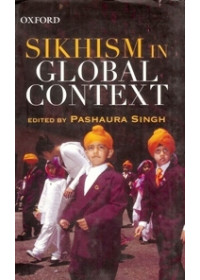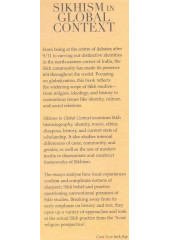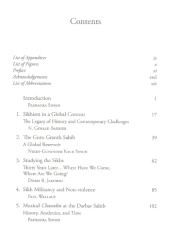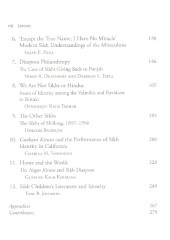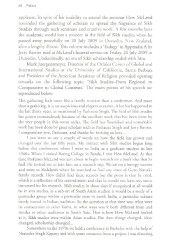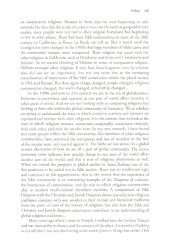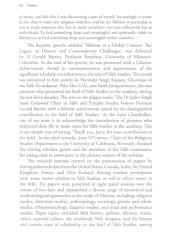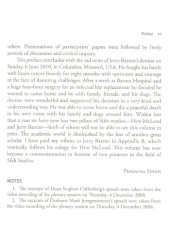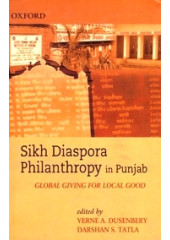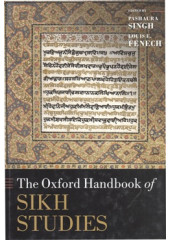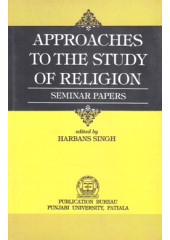Monday to Saturday - 10:00 Am to 9 PM
Now Enjoy Bulk Discounts on Books as Mentioned Below
These Discounts are in addition to the Discounts on Individual Books (Visible as Bulk Discount for Books in Cart)
Extra 10% Off If Books Purchased Exceeds Rs 3000 or 75 USD or 60 GBP or 60 Euro or 100 AUD or 100 CAD
Extra 15% Off If Books Purchased Exceeds Rs 6000 or 150 USD or 120 GBP or 120 Euro or 200 AUD or 200 CAD
Extra 20% Off If Books Purchased Exceeds Rs 15000 or 225 USD or 180 GBP or 180 Euro or 300 AUD or 300 CAD
Extra 25% Off If Books Purchased Exceeds Rs 30000 or 300 USD or 240 GBP or 240 Euro or 400 AUD or 400 CAD
Introduction To 'Sikhism In Global Context' By Pashaura Singh
From being at the centre of debates after 9/11 to carving out distinctive identities in the north-eastern corner of India, the Sikh community has made its presence felt throughtout the world. Focusing on globalization, this book reflects the widening scope of Sikh studies from religion, ideology, and history to contentious issues like identity, culture, and social relations.
Sikhism in Global Context examines Sikh historiography, identity, music, ethics, diaspora, history, and current state of scholarship. It also studies internal differences of caste, community, and gender, as well as the use of modern media to disseminate and construct frameworks of Sikhism.
The essays analyse how local experiences confirm and complicate notions of diasporic Sikh belief and practice questioning conventional premises of Sikh studies. Breaking away from its early emphasis on history and text, they open up a variety of approaches and look at the actual Sikh practice from the 'lived religion perspective'.
Written to honour W.H. McLeod and N. Gerald Barrier, two pioneers of Sikh studies, this book will interest scholars and students of Sikh studies, history, religion, and diaspora studies.
Preface To 'Sikhism In Global Context' By Pashaura Singh
This volume grows out of a three-day international research seminar hosted by the Dr Jasbir Singh Saini Endowed Chair in Sikh and Punjabi Studies and the Religious Studies Department of the University of California from 4 to 6 December 2008. Addressing the theme of the seminar, 'Sikhism in Global Context', twenty-two participants from four continents focused on Sikh life and thought as a global community. The plenary session of this seminar began on Thursday evening, 4 December 2008, with a reception held at Riverside's Mission Inn, a National Historical Landmark. At this event, conference participants and guests were greeted by Professor Stephen Cullenberg, Dean of the College of Humanities, Arts and Social Sciences (CHASS) at the University of California, Riverside.
In his welcome address, Dean Cullenburg appreciated the theme of the seminar from a global angle: 'The theme of this conference meets broadly with the type of college we are trying to build here, as international in its scope, and I am very glad to be a part of this conference on Sikhism in global context. Many of our departments focus on South East Asian Studies [with a focus on] texts, rituals and performance [SEATrip]; we also have growing departments of Middle Eastern Studies, Islamic Studies, Latin-American Studies, and Global Studies. We have adopted a motto this year, "At Home in the World", showing the diversity in Riverside and that this is the most diverse campus in UC California and in the country.
As the organizer of the seminar, I showed the audience a beautiful bouquet of flowers that was sent from New Zealand especially for the occasion with a brief note: 'To Pashaura Singh, Baljeet and all assembled for the gathering. Greetings! Best wishes from Hew McLeod and Margaret'. The audience acknowledged the gift with a thunderous applause. In spite of his inability to attend the seminar Hew McLeod reminded the gathering of scholars to spread the fragrance of Sikh Studies through such seminars and creative work. A few months later the academic world lost a pioneer in the field of Sikh studies when he passed away peacefully on 20 July 2009 in Dunedin, New Zealand, after a lengthy illness. This volume includes a 'Eulogy' in Appendix A by Jerry Barrier read at McLeod's funeral service on Friday, 24 July 2009 in Dunedin. Undoubtedly, an era of Sikh scholarship ended with him.
Mark Juergensmeyer, Director of the Orfalea Center of Global and International Studies at the University of California , Santa Barbara and President of the American Academy of Religion provided opening remarks on the following topic: 'Sikh Studies--From Regional to Comparative to Global Contexts'. The main points of his speech are reproduced below:
This gathering feels more like a family reunion than a conference. And more than a gathering, it is an auspicious and elegant occasion. A lot has happened in the last thirty years, as mentioned by Pashaura Singh. The field of Sikh studies has grown tremendously because of the excellent work that has been done by the very people in this room today. The field has flourished and remarkable work has been done by great scholars such as Pashaura Singh and Jerry Barrier. I congratulate you, Pashaura, and thanks for inviting us here...
I just want to say a couple of words on how the field has grown and changed over the last fifty years. My contact with Sikh studies began long before this conference, when I went to India as a graduate student in late 1960s. When I visited Baring College in Batala, I met Hew McLeod. At that time Professor McLeod was just about to begin research on a book idea that he had. He invited me to join him on a research trip. We sat on a bumpy scooter and went to Rishikesh where he searched to find any trace of Guru Nanak's family records. Hew didn't find these records but the point is that he tried, which is a reflection of his commitment and that he would not leave any stone unturned for his research. Sikh studies in those days if recognized at all would be in area studies, as a sub-set of South Asian Studies; it would be a study of a particular group within a particular state in north India, a particular culture firmly rooted in Indian tradition. So the question at that time was: what were its connections to other faiths, in what ways was it both different from and similar to other traditions in South Asia. That is how Hew McLeod looked at it. Sikh studies were within Asian studies. But then things changed, ideas changed, scholarship changed...
Somewhere in the 1970s we held a conference in Berkeley with the help of Narinder Singh Kapany and with some resources from a project I was directing on comparative religions. Because in those days we were beginning to take seriously the idea that the study of cultures were not the same as geographic area studies, since people were not tried to their original homeland but beginning to live in other places. There had been Sikh communities in most of the 20th century in California, as Bruce La Brack can tell us. But it wasn't untill the immigration laws changed in the 1960s that large numbers of Sikh came and the community became more recognized. Their religion was equal with the other religions in California, such as Hinduism and Islam and Christianity and Judaism. So we started thinking of Sikhism in terms of comparative religion, Sikhism amongst other religions. It may have been forgotten once by scholars who did not see its importance, but not any more due to the increasing consciousness of importance of the Sikh community within the plural society in USA and Europe. But then again things changed, people changed, religious communities changed, the world changed, scholarship changed...
In the 1990s and now in 21st century we are in the era of globalization. Everyone is everywhere and currents in one part of world affect currents in other parts of world. And we are not looking only at comparing religions but looking at their role within the global community of humanity. We as scholars are trying to understand the ways in which common currents and interests are expressed and interact with other religions. It is this context that we look at the ways in which religions interact, sometimes congenially, sometimes violently, with each other and with the secular state. In my own research, I have found that some people within the Sikh community, like members of others religious communities, have perceived the corruption and loss of morality in the face of the secular state, and reacted against it. The Sikhs are not alone; it's a global current illustrative of how we are all a part of global community. The recent economic crisis indicates how quickly things in one part of the world affect another part of the world, and this is true of religious phenomena as well. When we started the program in global studies in Santa Barbara one of the first positions to be added was in Sikh studies. There was an intellectual logic and coherence to this appointment, that is, the notion that the experience of the Sikh community is an interesting example of the Diaspora of cultures, the interaction of communities, and the role in which religious communities play in modern multi-cultural pluralistic societies. A comparison of Sikh Diaspora with the Christian and Jewish Diaspora shows not only how religious traditions compare with one another in their textual and historical traditions from the point of view of the history of religions, but also how the Sikh and Christian and Jewish diaspora experiences contribute to an understanding of global religious traditions...
Many years ago when I came to Punjab, I walked into the Golden Temple and was stunned by its beauty and the serenity of the place. I remember thinking to myself that I was not discovering some exotic place or thing; but rather, I felt at home, and felt that I was discovering a part of myself. Increasingly it seems to me, that to study any religious tradition, and for me Sikhism in particular, is not to study someone else, but to study ourselves--not just collectively but as individuals. To find something deep and meaningful and spiritually viable in Sikhism is to find something deep and meaningful wiithin ourselves...
The keynote speech, entitled 'Sikhsm in a Global Context: The Legacy of History and Contemporary Challenges', was delivered by N. Gerald Barrier, Professor Emeritus, University of Missouri-Columbia. At the end of his speech, he was presented with a Lifetime Achievement Award in commemoration and appreciation of his significant scholarly contributions in the area of Sikh Studies. The award was presented to him jointly by Narinder Singh Kapany, Chairman of the Sikh Foundation, Palo Alto (CA), and Mark Juergensmeyer, the two pioneers who promoted the field of Sikh Studies in the academy during the last three decades. The text on the plaque reads: 'The Dr Jasbir Singh Saini Endowed Chair in Sikh and Punjabi Studies honors Norman Gerald Barrier with a lifetime achievement award for his distinguished contribution to the field of Sikh Studies'. As the Saini Chairholder, one of my aims is to acknowledge the contribution of pioneers who dedicated their life to make space for Sikh Studies in the academy. This is our simple way of saying, 'Thank you, Jerry, for your contribution to the field'. In her final remarks, June O' Connor, Chair of the Religious Studies Department at the University of California, Riverside, thanked the visiting scholars, guests and the members of the Sikh community for taking time to participate in the plenary session of the seminar.
The research seminar centred on the presentation of papers by distinguished scholars from the United States, Canada, India, the United Kingdom, France, and New Zealand. Among seminar participants were many senior scholars in Sikh Studies, as well as others newer to the field. The papers were presented in eight panel sessions over the course of two days and represented a diverse range of theoretical and methodological approaches to the study of Sikhism, including: religious studies, historical studies, anthropology, sociology, gender and ethnic studies, ethnomusicology, diaspora studies, and ritual and performance studies. Paper topics included Sikh history, politics, identity, music, ethics, material culture, the worldwide Sikh diaspora, and the history and current state of scholarship in the field of Sikh Studies, among others. Presentations of participants' papers were followed by lively periods of discussion and critical inquiry.
This preface concludes with the sad news of Jerry Barrier's demise on Sunday, 6 June 2010, in Columbia, Missouri, USA. He fought his battle with brain cancer bravely for eight months with optimism and courage in the face olf daunting challanges. After a week at Barnes Hospital and a huge four-hour surgery for an infected hip replacement he decided he wanted to come home and be with family, friends, and his dogs. The doctors were wonderful and supported his decision in a very kind and understanding way. He was able to come home and die a peaceful death in his own room with his family and dogs around him. Within less than a year we have now lost two pillars of Sikh studies-----Hew McLeod and Jerry Barrier----both of whom will not be able to see this volume in print. The academic world is diminished by the loss of another great scholar. I have paid my tribute to Jerry Barrier in Appendix B, which ironically, follows his eulogy for Hew McLeod. This volume has now become a commemoration in honour of two pioneers in the field of Sikh Studies.
Table of Contents of 'Sikhism In Global Context' By Pashaura Singh
|
Contents |
||
| List of Appendices | ix | |
| List of Figures | x | |
| Preface | xi | |
| Acknowledgements | xvii | |
| List of Abbreviations | xix | |
| Introduction | 1 | |
| PASHAURA SINGH | ||
| 1. | Sikhism in a Global Context | 17 |
| The Legacy of History and Contemporary Challenges | ||
| N. GERALD BARRIER | ||
| 2. | The Guru Granth Sahib | 39 |
| A Global Reservoir | ||
| NIKKY-GUNINDER KAUR SINGH | ||
| 3. | Studying the Sikhs | 62 |
| Thirty Years Later.. Where Have We Come, | ||
| Where Are We Going? | ||
| DORIS R. JAKOBSH | ||
| 4. | Sikh Militancy and Non-violence | 85 |
| PAUL WALLACE | ||
| 5. | Musical Chaunkis at the Darbar Sahib | 102 |
| History, Aesthetics, and Time | ||
| PASHAURA SINGH | ||
| 6. | 'Except the True Name, I Have No Miracle' | 130 |
| Modern Sikh Understandings of the Miraculous | ||
| SUSAN E. PRILL | ||
| 7. | Diaspora Philanthropy | 146 |
| The Case of Sikhs Giving Back to Punjab | ||
| VERNE A. DUSENBERY AND DARSHAN S. TATLA | ||
| 8. | We Are Not Sikhs or Hindus | 165 |
| Issues of Identity among the Valmikis and Ravidasis in Britain | ||
| OPINDERJIT KAUR TAKHAR | ||
| 9. | The Other Sikhs | 185 |
| The Sikhs of Shillong, 1897-1996 | ||
| HIMADRI BANERJEE | ||
| 10. | Gurbani Kirtan and the Performance of Sikh | 208 |
| Identity in California | ||
| CHARLES M.TOWNSEND | ||
| 11. | Home and the World | 228 |
| The Nagar Kirtan and Sikh Diaspora | ||
| GURVEEN KAUR KHURANA | ||
| 12. | Sikh Children's Literature and Identity | 249 |
| TOBY B. JOHNSON | ||
| Appendices | 267 | |
| Contributors | 279 |
About the Author Of 'Sikhism In Global Context'
Pashaura Singh is Dr Jasbir Singh Saini Endowed Chair in Sikh and Punjabi Studies, University of California. He has written and edited many scholarly works on Sikhism, including Life and Work of Guru Arjan (2006) and The Guru Granth Sahib (2000).
Sikhism In Global Context - Book By Pashaura Singh
- Brand: Oxford University Press
- Product Code: SIK132
- Availability: Out Of Stock
-
Rs.745.00
Related Products
Historical Dictionary Of Sikhism - Book By W.H. McLeod
From The Backcover Of 'Historical Dictionary Of Sikhism' By W. H. McLeod A comprehensive dict..
Rs.845.00
Textures Of The Sikh Past - Book By Tony Ballantyne
Introduction To 'Textures of The Sikh Past' By Tony Ballantyne Focusing on new directions in ..
Rs.695.00
Sikh Diaspora Philanthropy In Punjab Global Giving For Local Good - Book By Verne A. Dusenbery & Darshan S. Tatla
Introduction To 'Sikh Diaspora Philanthropy In Punjab - Global Giving For Local Good' By Verne A. Du..
Rs.750.00
The Oxford Handbook Of Sikh Studies - Edited By Pashaura Singh & Louis E. Fenech
From The Front Cover Of 'The Oxford Handbook Of Sikh Studies' By Pashaura Singh & Louis E. Fe..
Rs.1,995.00
Approaches To The Study Of Religion - Book By Harbans Singh
Preface To 'Approaches To The Study Of Religion' By Harbans Singh The study of religion has y..
Rs.200.00
Exploring Sikhism - Aspects Of Sikh Identity, Culture, And Thought - Book By W.H.Mcleod
Introduction To 'Exploring Sikhism , Aspects Of Sikh Identity, Culture, And Thought' By W.H.Mcleo..
Rs.250.00

